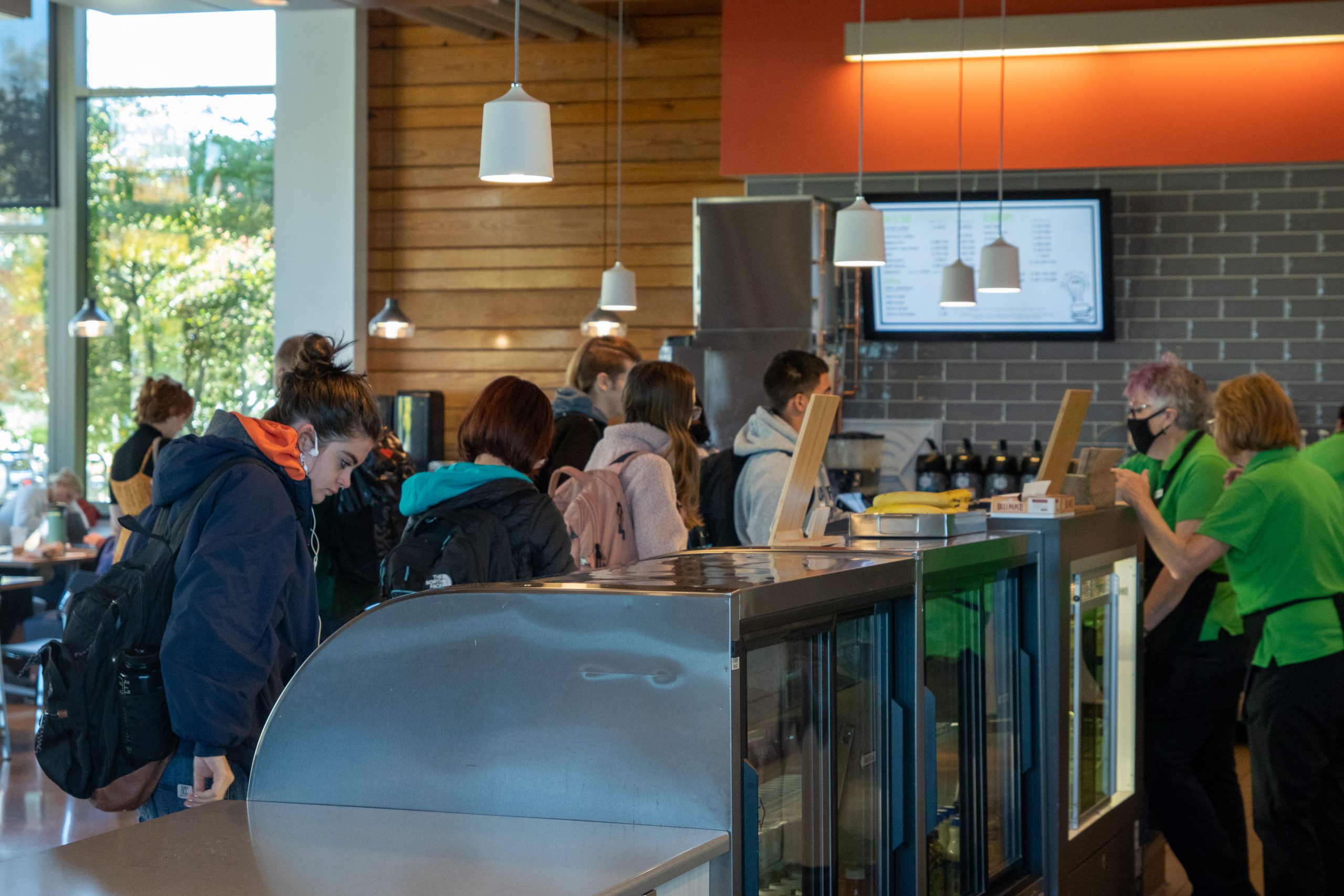The opinions expressed in The Lawrentian are those of the students, faculty and community members who wrote them. The Lawrentian does not endorse any opinions piece except for the staff editorial, which represents a majority of the editorial board. The Lawrentian welcomes everyone to submit their own opinions. For the full editorial policy and parameters for submitting articles, please refer to the about section.
No matter where you go to school, university dining is no three-star Michelin experience. However, complaints about the limited meal plan systems at Lawrence and the quality of food supplied by the dining services company, Bon Appétit, frequently dominate conversations on improvements at Lawrence. Rather than engaging in circular discourse about how “dining services suck,” I think this is a great opportunity to identify the crucial problems so we can seek new solutions to create a more positive relationship between Lawrence students and the dining services system.
Let’s start with the facts. Lawrence requires all students to purchase a meal plan, unless they are a fifth-year student, living off-campus or qualify for a dietary or religious exemption. To secure an exemption, students must pass a rigorous evaluation from a dietician who is employed by Bon Appétit.
Bon Appétit runs all three dining venues on Lawrence’s campus: Andrew Commons, Kaplan’s Café and Kate’s Corner. Andrew Commons serves all-you-can-eat food for one meal swipe, whereas Kate’s Corner sells mostly pre-packaged snacks and instant meals. Kaplan’s Café provides a mixture of baked breakfast goods, pre-packaged sandwiches and a limited variety of meals. Kaplan’s Café and Kate’s Corner accept payment in the form of culinary cash, a prepaid balance designated for purchasing food. All three venues also accept debit and credit cards.
Currently, Lawrence offers three meal plans: 19 meals with $150 culinary cash, 14 meals with $250 culinary cash and 9 meals with $350 culinary cash. Students living in group housing can choose a meal plan that includes a budget for groceries, but it still includes 5 meal swipes.
Although all of Bon Appétit’s dining venues at Lawrence have passed necessary health code checks, many students report falling ill after eating at the commons on a regular basis—myself included. From a legal standpoint, these cases cannot be referred to as “food poisoning” without medical documentation, since not all foodborne illnesses fall under food poisoning. However, the fact still stands: a large number of Lawrence students are unable to digest the food they are being served without some degree of negative physical side effects.
Even for students who don’t experience illness, the Commons’ hours do not always work for students’ busy schedules. Although Lawrence has implemented a universal lunch break from classes on Mondays, Wednesdays and Fridays at 12:30 p.m., this rule does not apply for Conservatory classes. Many Conservatory students therefore have class during the Commons’ lunch hours, and with the recent downsizing of the Conservatory vending machines, these students have limited access to food until dinnertime.
The long lines in the Commons—particularly during the lunchtime rush—are also inconvenient for students who need to grab food quickly. Although the universal lunch break was intended to carve out a designated lunchtime for most students, it causes excessive traffic jams in the Commons because most students end up going to lunch at the same time. This is particularly notable during the Fall and Winter Terms because all First-Year Studies classes end at 12:20 p.m. and an army of 400 hungry first-year students charges into Andrew Commons for a post-class lunch. I have only about 20 minutes on Tuesdays to get lunch between work and meetings, and I often spend 10 minutes of it trying to get through the lines, find food that won’t make me sick, and locate an empty chair in the crowded Commons.
Many students who are unable to eat most of the food in Andrew Commons turn to Kaplan’s Café for meals. At the beginning of the COVID-19 pandemic, Lawrence allowed students to use their meal swipes in the Café during regular meal hours. However, the policy changed at the beginning of Fall Term 2022, and meal swipes could only be used in the Commons. After mass student complaints, meal swipes were allowed once again in the Café, but only for late-night dinners between 7:30 p.m. and 9 p.m.. For the rest of the day, the Café only accepts culinary cash.
This wouldn’t be a problem if Lawrence’s meal plans came with a sufficient amount of culinary cash. However, I’m on the meal plan with the highest amount of culinary cash, and I still barely have enough to buy my lunches, let alone snacks and coffee. Meanwhile, I’m paying for meal swipes I can’t even use because my schedule doesn’t align with the Commons’ regular dining hours.
Lawrence’s website states, “At Lawrence University, we believe dining together can help foster a sense of community, and that it’s an important part of our residential education experience. Meal plans encourage and support communal dining while offering flexibility to meet your individual needs.” While I do believe community-building at universities is essential, there are many other spaces where students can interact and build friendships. Right now, it seems like the only thing unifying students is their shared frustration with the meal plans.
I do understand that Lawrence does not receive public funding and therefore relies more heavily on housing and dining services for funds than public universities do. However, dining is a central aspect of students’ university experiences, and letting this issue go unaddressed will continue to affect Lawrence’s enrollment and retention rates. If we want to foster a positive campus community where students are able to thrive, we need to provide them with the means to easily nourish their minds and bodies so they can reach their full potential.

